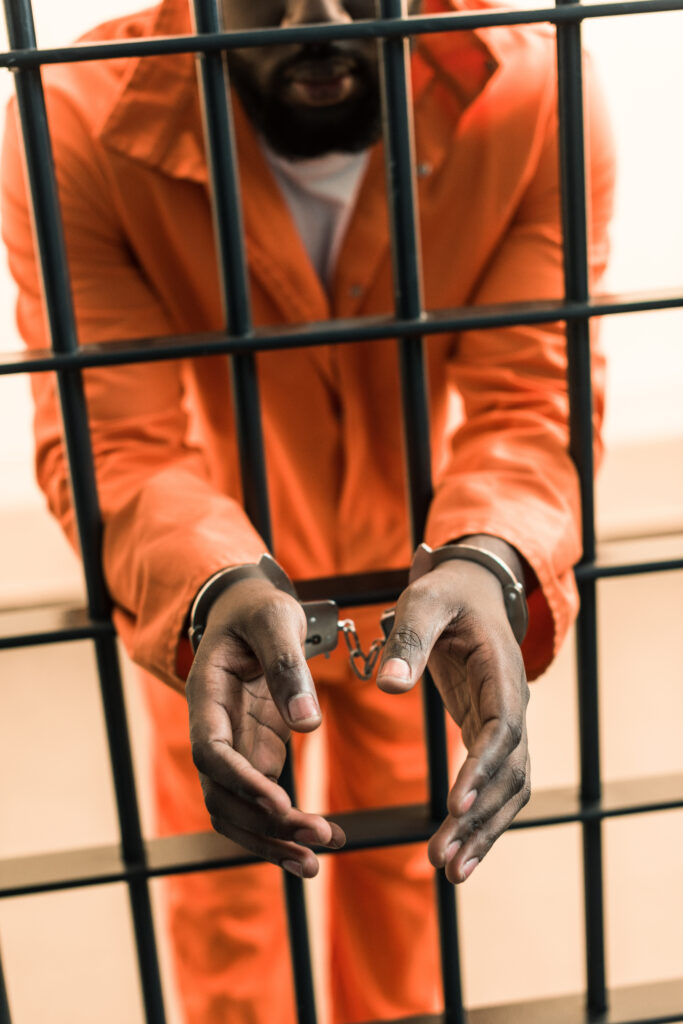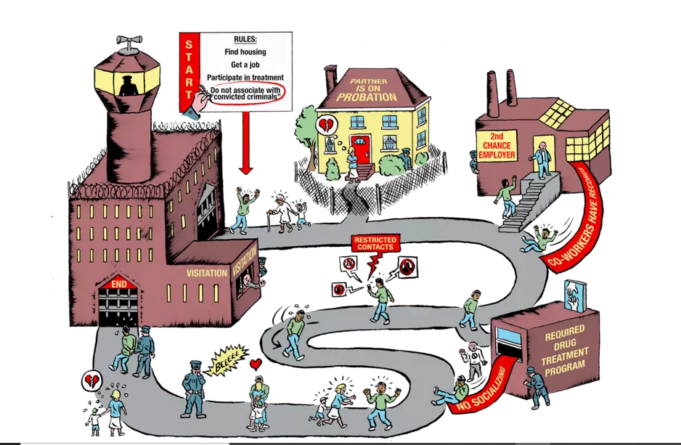For 3.7 million people on parole or probation in the United States, the very people who can best support their success are often unable to help because of supervision conditions that prohibit them from being in contact, a new briefing indicates.
The briefing, “Guilty by association: When parole and probation rules disrupt support systems,” was released Nov. 8 by Prison Policy Initiative and research analyst Leah Wang. Researchers found that requiring people on supervision to avoid others with criminal legal system contact can hinder their success in the community.
It’s common for probation and parole agencies to impose these “association” restrictions, tearing apart critical social networks and threatening to lock people up for harmless—and even helpful—interactions, researchers found.
According to Ms. Wang, research suggests that association-related release conditions are common in parole and probation. “These restrictions are relics of antiquated supervision systems that required people under their control to live virtuous lives, ‘be good,’ and associate with ‘good people,’” she wrote in the Nov. 8 online briefing.
The conditions, which force people on supervision to live in isolation and fear, make it nearly impossible to avoid prohibited associations for the estimated 24 million people in the U.S. who have a felony conviction on record, according to the briefing.

These restrictions disproportionately impact Black communities, as systemic racism is evident in every level of the system, from policing to prosecutorial decisions, pretrial release processes, sentencing, correctional discipline, and even reentry, according to Prison Policy Initiative research.
They generally prohibit interactions between people on supervision and large swaths of the population, such as those with felony convictions or others on probation or parole, she continued.
As a result, people must steer clear of certain places altogether, producing a complex web of prohibited activities and relationships that make it even harder to find housing and work, arrange for transportation, participate in treatment programs, or otherwise succeed in reentry, the briefing indicates.
A system ‘designed to enslave’
“First, we have to recognize that what we’re dealing with is a system, an industrial system that is designed to enslave us as a people and to extract from us all that can be extracted in terms of labor, whether we’re talking about entertainment or common, every day, ordinary, workaday laborers,” stated Efia Ngwaza, founding director of the Malcolm X Center for Self-Determination in Greenville, S.C.
That is the basis of the Three Strikes law, mandating a life sentence once someone is convicted of three felony crimes, argued Ms. Ngwaza. “That you can wind up spending inordinate amounts of time incarcerated, first time, second time, then you go steal a bicycle in order to relieve yourself of the pain of living in a violent, hostile society, and you wound up incarcerated for life,” she told The Final Call.
She doesn’t claim to have the answers but raised a challenge out of her more than 45 years of prisoner support work. “We can volunteer to teach our children to read. It doesn’t cost anything. It’s not illegal anymore. There’s no risk in it and statistics show that folks who cannot read on grade level by the 3rd and 4th grade are immediately tracked into the prison system,” she stated.
The briefing noted that parole and probation typically mandate a set of “standard” conditions or rules for everyone regardless of their crime or circumstances, for example, obeying the law and maintaining contact with a supervision officer. But they may also include irrelevant mandates, such as drug testing even for people whose conviction was unrelated to drug use, the briefing indicates.
For example, there “are often ‘special’ conditions too, which are optional additions a judge, parole board, supervision officer, or other authority can impose at their discretion—and often at any point while someone is on supervision. In many jurisdictions, special conditions offer authorities carte blanche for setting nearly any rule imaginable, it continued.
Some special conditions include mandated treatment programs, a curfew, and restrictions on associating with certain other people, but they can also extend to bizarre rules, such as prohibiting someone from ever sitting in the front seat of a car or becoming pregnant, according to the briefing. It lists the following on how probation agencies in some of the largest jurisdictions impose association restrictions:
• Georgia, which has the largest probation population in the U.S. at over 347,000, requires people to “avoid persons or places of disreputable or harmful character.”
• The three biggest counties in Texas—Harris, Dallas, and Tarrant counties—also impose this condition on anyone under probation supervision.
• California, which had over 157,000 people on probation in 2021, imposes a standard condition wherein people must “refrain from becoming abandoned to improper associates.” In other words, not associating with anyone that has a criminal record.
“If these conditions sound a bit archaic and vague, it’s because they are. Association restrictions needlessly complicate life in the community and should be eliminated from supervision rules,” stated Ms. Wang.
Recommendations and remedies
“We urge states to abolish association restrictions for people on parole—unnecessary policies that can scare people away from their most supportive relationships with friends and family. We also urge states to take other steps to make parole supervision more focused on support and less on surveillance and punishment,” said Wanda Bertram, Prison Policy Initiative communications strategist.
For example, over a quarter of people on parole don’t have health insurance—a problem that parole offices could easily ameliorate by helping people apply for Medicaid and Medicare, she said. And, Ms. Bertram told The Final Call in an email correspondence that people on parole who are struggling with homelessness would benefit greatly—and be more likely to stay out of prison—if cities and states invested in Housing First programs.
These types of programs provide unconditional housing with embedded services aimed at reducing chronic homelessness and incarceration, and improving quality of life—especially for people experiencing substance use disorder and mental illness, according to Prison Policy Initiative research.
Researchers argue that the myth of the “career criminal’ or permanent criminal disposition has been busted time and again by evidence such as highly regarded reentry organizations that use “mutual help” or “credible messenger” models that employ formerly incarcerated people as counselors and mentors to others navigating reentry.
One example is Troy Muhammad, the Detroit representative of the Honorable Minister Louis Farrakhan. At one time in his life, he walked the hallways and yards of Ryan Correctional Facility in shackles as an inmate. However, today, he serves as student minister of Mosque No. 1, not a repeat offender.
After several years of being released, he was invited by inmates and finally permitted by prison officials to go back in to share a positive word from the Teachings of the Most Honorable Elijah Muhammad, as taught by Minister Farrakhan, noted Nation of Islam National Prison Reform Minister Abdullah Muhammad in a previous Final Call article. He spoke to approximately 50 inmates.
Nowadays, some men served a lot of time together, and some get out, some don’t, or they get out later, explained Student Minister Troy Muhammad. He shared the story of a formerly incarcerated Black man who had been locked up for 36 years.
According to Student Minister Troy Muhammad, they were incarcerated around the same time but he was released 10 years later but the other man remained for 26 more years. “His family passed away. All connections to the world passed away, so all he had to reach out to for guidance and help were those who were formerly incarcerated, who knew of him,” stated Student Minister Troy Muhammad.
To be threatened with violations because he associates with those who are formerly incarcerated almost had him return to prison, he shared. Fortunately, the man’s parole officer gave him a pass to be around Student Minister Troy Muhammad and similar brothers, based on her knowledge of them and their positive community activities, he said.
“So many people don’t get that opportunity and it puts them in a bad position because you don’t have anybody who can help you navigate some of the things that the average person may not know or just doesn’t understand. To have somebody who has walked through it successfully to be right there with you to say okay, do it this way, not that way. This is a route that I took to help me, [and] is very crucial for the man or woman who’s returning home from prison,” Student Minister Troy Muhammad added.
He emphasized that the Teachings of the Honorable Elijah Muhammad, which he accepted while in prison, saved and transformed his life, and he continues to go back, sharing the light of Islam with those who are still incarcerated. He was invited to speak on Dec. 1 at two prisons—to Level 2 (preparing for release within five years) and Level 4 (more serious crimes) inmates, he shared.
“The way I benefit the Level 4s is I was once a Level 4. And to be able to get out and show them that all doors aren’t closed. Allah [God] can open doors, so just keep working on yourself, and keep working on your cases and doing those things and those doors can come open,” he stated.
“For me, it’s a rewarding work, because you get to see where you’ve been and you know what The Teachings actually did for you, where it took you from,” he continued.
“The beautiful things that I tell a lot of human beings when it comes to the Honorable Minister Louis Farrakhan is his voice is the voice of God. So, when you are connected to him, he didn’t have to be incarcerated. He didn’t have to share the similar experiences that you shared. The voice of God, he already knows it,” Student Minister Troy Muhammad stated.
“He has God in him and through him, so just finding his voice can free us all up in so many ways, and it’s not just prisons that we’re in physically but the prisons of life that we all find ourselves in. The Honorable Minister Louis Farrakhan has a word for us all.”
Student Minister Troy Muhammad and other former inmates go into the juvenile facility to try to help direct young offenders away from the permanent underclass that the system is setting them up for. Due to the advocacy of former inmates and their pressure on city services to hire former offenders, laws are being changed, he noted.
“It’s just having that experience next to you to help guide you through some of those mistakes that human beings make, especially in this world,” he said.













